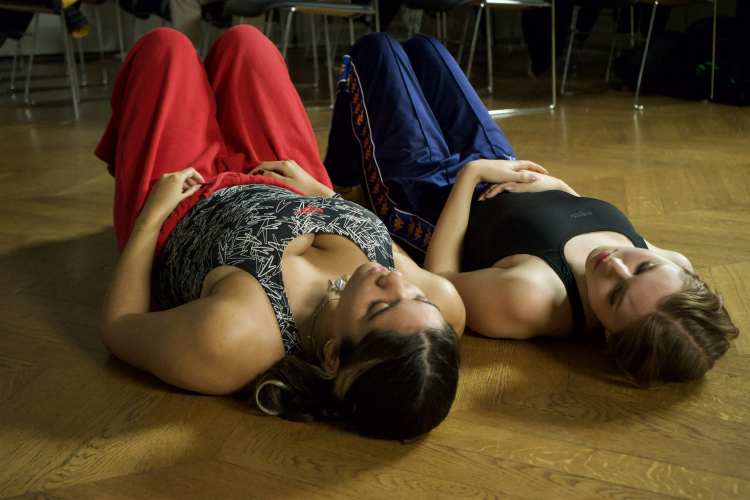Women’s Rights, Theater Arts and an Abortion on Campus

Since the launch of Vivre last year, musicians, actors and dancers have been able to display their talents in recitals, musicals and plays. This semester, Vivre presented Dryland, a play written by Ruby Rae Spiegel, which tackles social issues and womanhood that are tragically represented when two high school girls are challenged with handling an unwanted pregnancy. This women-led playwas directed by Marteena Mendlssohn and opened on November 16 on the AUP campus.
Image Credit: Hera SoysalIn the 90 minute performance, viewers watched as the characters' budding friendship is tested as they attempt to “handle” the unwanted pregnancy in a multitude of ways.
“This is a very fun character to adjust to and make apart of my life,” said Sarah Affonso, who played Amy in the production, despite the heavy subject matter.
Sterling Knight, who plays Esther in the show, and Mendelssohn, they made clear that they find ways to keep things light and fun on set while portraying characters that are going through traumatic events.
"When I first read this play, I was filled with shock, frustration, and hope," said Mendelssohn. "The connection towards the characters and the way they interact with each other made the play stick with me. While Amy has a reputation she wants to uphold, Esther wants to support her which creates a particular type of tension that can be seen throughout the play. The question of, 'do they actually like each other, or are they stuck together?' is constantly asked from one scene to another. But perhaps that’s not the question we should be asking. The real question is, 'who do we go to in our times of trouble and need, and why?'"
Image Credit: Hera SoyalFor rehearsal, a classroom in the Combes building was transformed into a stage, with stage managers Sophia Ellis and Rensina Salerno taking care of props and following sound cues. Anthony El Ghazal worked on lites, and Mendelssohn stopped the actors to give stage directions, identifying where fake blood should be, and where to place the fetus as the actors continued to practice their scene.
I watched as Affonso laid on the floor, moaning in pain, as Knight's character comforted her. Mendelssohn spent weeks of rehearsal observing, giving suggestions and asking questions that led the actors to dig deeper into their characters.
Image Credit: Hera SoysalOpening night saw 60 guests in attendance, dramatic lighting, sad music and a lot of fake blood. In addition to the difficult themes of the play, it also had a characters that provided some comic relief, portrayed by Gabriella Mendes, Dylan Kornhauser, and Isaac Bates. I sat front row watching the same scenes from rehearsals be performed all out for an unsuspecting audience.
The play comes after a summer where women's reproductive rights were reduced in the U.S. after the Supreme Court's overturning of the 50-year precedent set by Roe v. Wade. The production, a play written by women, directed by women, and starring women, takes place on campus in an age where women's rights are at the forefront of attacks. In the end, after the beautiful performance took place, the audience was left shocked and bewildered at how any teenager could go through this process alone. The fact is, they shouldn't.










